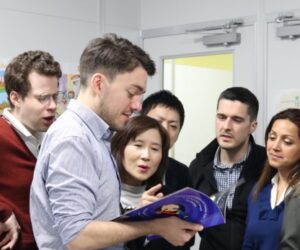Learners & teachers share the fight against fatigue in language classrooms
Why do some people give up when other people persist?
For a language teacher, this is an important question. The answer to it can help shape how we teach. Teachers need to grow resilient students who struggle through challenges.
For teachers, too, on a personal level, we can burn out. Knowing how to battle teaching fatigue is critical for teachers to remain motivated in our profession.
For a language school, this is also an important question. Students who quit after one or two years severely limit a school’s growth compared to students who continue with lessons six, eight, ten years or more.
From a management perspective, as well, employees who quit because of fatigue hurt the school’s ability to grow a professional, experienced staff. Teacher turnover at language schools tends to be exceptionally high. We want people to leave jobs for the right reasons–when they find new opportunities to grow–not because of work fatigue. If a school can keep teachers an average of even one or two years longer than they otherwise would, the gains in quality and productivity and savings in hiring costs are tremendous.
For language learners, too, why some learners give up is an important question. Most people have started a new task with a great deal of energy, but then burned out and quit after a short time. How can we better regulate our efforts to persist and grow over a long period?
A new study published in Nature Communications from researchers at the Universities of Birmingham and Oxford may help teachers and learners better understand how fatigue affects motivation.
The researchers matched up people’s willingness to persist in a physical task that earned rewards with brain activity on fMRI scans to show how motivation and fatigue fluctuate moment by moment. The researchers observed two states of fatigue occurring in separate parts of the brain. Short-term, recoverable fatigue builds after we exert effort, but it can be reduced with rest. Long-term, unrecoverable fatigue builds gradually with work, and it does not go away with short rests.
How does this help language learners and teachers?
There may be some differences in the fatigue felt from a physical task and the mental tasks of language learning or teaching. However, the stresses of language learning and teaching parallel the tiredness of muscles in many respects. There is a lot for language learners and teachers to glean from and reflect upon in this research:
- Pacing and setting appropriate challenges is critical. Doing the same activity again and again for very long can leave the body and brain tired. Trying to do too much all at once can produce frustration. We need to pace our students and ourselves with appropriate challenges that spark motivation without building debilitating fatigue.
- We need variety. Between challenges, we need frequent short rests. This rest might be something as simple as a relatively easy, unrelated distractor task to let the brain reset. We sometimes also need vacations to help prevent long-term fatigue from building up.
- How we use rewards can make a difference. One aspect of fatigue that the researchers did not explore was loss of interest in the reward. How often were test subjects giving up, not because they physically couldn’t do the task anymore, but because the reward had become boring and insignificant? Receiving the same reward over and over can lead to a loss in motivation. I often see this in games with students–when each success earns exactly one point, students give up on the game quickly. When success earns a chance at a random number of points, students stay much more interested.
- Meaningful tasks are better motivators than artificial rewards. The researchers did not measure the intrinsic value that participants felt toward the task. Squeezing a dynamometer is, on its own, not especially engaging. If there were no reward, would anyone have found value in gripping the meter tightly? Gripping a dynamometer carries no consequence…compared, say, to gripping a rope with a person’s life hanging in the balance.
People will sometimes invent meaning for themselves. If put into a group, some might motivate themselves by transforming the gripping task into a competition. Once the strongest grip was determined? This motivation would be at an end. Individually, a person desiring more grip strength might persist with the task as exercise, especially if the dynamometer could measure improvement over time. However, for most people, gripping a meter for a few seconds and releasing does not carry the feeling of having accomplished anything important.
Menial tasks that do not grow or build anything, that lack value outside of artificial rewards, are ideal breeding grounds for fatigue. Language taught in meaningful contexts, with fitting risks and rewards for failures and successes, will always sustain motivation better than drills or even than games that rip language out of context.
Students and teachers share a need for meaningful challenges. We share a need for agency. We likewise need supportive environments that create opportunities for us and ensure us time to rest.
Nobody stays motivated for very long with small, repetitive challenges, especially if the task lacks intrinsic value. We can trick our brains with artificial rewards only for so long. To stay motivated, we occasionally need difficult, novel challenges, and we need tasks with meaningful consequences.
A profound sense of accomplishment can grow out of a difficult, worthwhile challenge. Desire for accomplishment can generate persistence far beyond any reward. Desire won’t stave off fatigue, but it can help us cope and overcome fatigue until we reach a well-earned rest.








